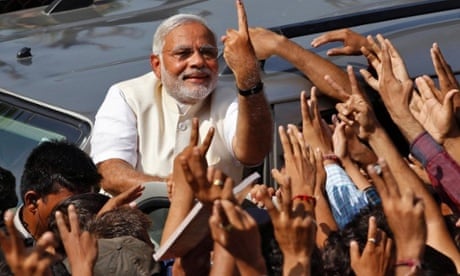by PANKAJ MISHRA

Narendra Modi shows his inked finger after casting his vote in Ahmedabad. PHOTO: Amit Dave/Reuters
With the rise of Hindu nationalist Narendra Modi culminating in this week’s election, Pankaj Mishra asks if the world’s largest democracy is entering its most sinister period since independence
In A Suitable Boy, Vikram Seth writes with affection of a placid India’s first general election in 1951, and the egalitarian spirit it momentarily bestowed on an electorate deeply riven by class and caste: “the great washed and unwashed public, sceptical and gullible”, but all “endowed with universal adult suffrage”. India’s 16th general election this month, held against a background of economic jolts and titanic corruption scandals, and tainted by the nastiest campaign yet, announces a new turbulent phase for the country – arguably, the most sinister since its independence from British rule in 1947. Back then, it would have been inconceivable that a figure such as Narendra Modi, the Hindu nationalist chief minister of Gujarat accused, along with his closest aides, of complicity in crimes ranging from an anti-Muslim pogrom in his state in 2002 to extrajudicial killings, and barred from entering the US, may occupy India’s highest political office.
Modi is a lifelong member of the Rashtriya Swayamsevak Sangh (RSS), a paramilitary Hindu nationalist organisation inspired by the fascist movements of Europe, whose founder’s belief that Nazi Germany had manifested “race pride at its highest” by purging the Jews is by no means unexceptional among the votaries of Hindutva, or “Hinduness”. In 1948, a former member of the RSS murdered Gandhi for being too soft on Muslims. The outfit, traditionally dominated by upper-caste Hindus, has led many vicious assaults on minorities. A notorious executioner of dozens of Muslims in Gujarat in 2002 crowed that he had slashed open with his sword the womb of a heavily pregnant woman and extracted her foetus. Modi himself described the relief camps housing tens of thousands of displaced Muslims as “child-breeding centres”.
Such rhetoric has helped Modi sweep one election after another in Gujarat. A senior American diplomat described him, in cables disclosed by WikiLeaks, as an “insular, distrustful person” who “reigns by fear and intimidation”; his neo-Hindu devotees on Facebook and Twitter continue to render the air mephitic with hate and malice, populating the paranoid world of both have-nots and haves with fresh enemies – “terrorists”, “jihadis”, “Pakistani agents”, “pseudo-secularists”, “sickulars”, “socialists” and “commies”. Modi’s own electoral strategy as prime ministerial candidate, however, has been more polished, despite his appeals, both dog-whistled and overt, to Hindu solidarity against menacing aliens and outsiders, such as the Italian-born leader of the Congress party, Sonia Gandhi, Bangladeshi “infiltrators” and those who eat the holy cow.
Modi exhorts his largely young supporters – more than two-thirds of India’s population is under the age of 35 – to join a revolution that will destroy the corrupt old political order and uproot its moral and ideological foundations while buttressing the essential framework, the market economy, of a glorious New India. In an apparently ungovernable country, where many revere the author of Mein Kampf for his tremendous will to power and organisation, he has shrewdly deployed the idioms of management, national security and civilisational glory.
The Guardian for more